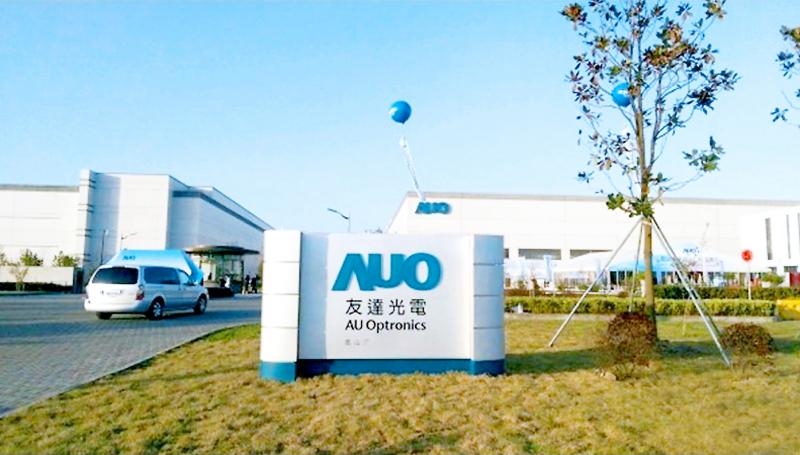LCD panelmaker AU Optronics Corp (AUO, 友達光電) is planning to invest NT$91.08 billion (US$3.26 million) over the next few years to expand its capacity to domestically produce panels used in premium notebook computers, the Hsinchu-based company said on Tuesday.
The investment would be part of the company’s efforts to boost production resilience and safeguard market share, AUO said in a statement.
It aims to increase capacity at its 8.5-generation and 6-generation plants in Taichung, and produce more panels with advanced hyper viewing angle technology to satisfy prospective rising demand in the post-COVID-19 era, it said.

Photo: Chen Mei-ying, Taipei Times
AUO also plans to spend NT$10 billion a year on the development of cutting-edge technologies and the enhancement of manufacturing capabilities, it said.
The panel maker has about 20,000 employees nationwide and is planning to create 2,700 new jobs, according to its four-year investment plan.
AUO also plans to expand panel manufacturing capacity in China to make low-temperature-poly-silicon panels (LTPS) used in high-end notebook computers, it said.
The company last quarter commanded about 60 to 70 percent of the world’s LTPS panel market, it said.
AUO on Tuesday received approval from the Investment Commission to invest US$617 million in its Chinese subsidiary in Kunshan, which would allow it to fully take over the subsidiary, of which it currently owns 51 percent, it said.
The commission also approved another US$384 million investment in the subsidiary, which would be used to expand the unit’s output to 47,000 units per month, it said.
“Given that the planned investment in Taiwan clearly exceeds the investment in China, we decided to approve AUO’s investment there,” the commission said. “As the Chinese subsidiary would handle simple manufacturing, we estimate that the risk of technology leakage is minimal.”
The commission also approved a China-bound investment of US$115 million by KGI Bank (凱基銀行), a subsidiary of China Development Financial Holding Corp (中華開發金控), to develop its consumer financial business in the nation.

IN THE AIR: While most companies said they were committed to North American operations, some added that production and costs would depend on the outcome of a US trade probe Leading local contract electronics makers Wistron Corp (緯創), Quanta Computer Inc (廣達), Inventec Corp (英業達) and Compal Electronics Inc (仁寶) are to maintain their North American expansion plans, despite Washington’s 20 percent tariff on Taiwanese goods. Wistron said it has long maintained a presence in the US, while distributing production across Taiwan, North America, Southeast Asia and Europe. The company is in talks with customers to align capacity with their site preferences, a company official told the Taipei Times by telephone on Friday. The company is still in talks with clients over who would bear the tariff costs, with the outcome pending further

A proposed 100 percent tariff on chip imports announced by US President Donald Trump could shift more of Taiwan’s semiconductor production overseas, a Taiwan Institute of Economic Research (TIER) researcher said yesterday. Trump’s tariff policy will accelerate the global semiconductor industry’s pace to establish roots in the US, leading to higher supply chain costs and ultimately raising prices of consumer electronics and creating uncertainty for future market demand, Arisa Liu (劉佩真) at the institute’s Taiwan Industry Economics Database said in a telephone interview. Trump’s move signals his intention to "restore the glory of the US semiconductor industry," Liu noted, saying that

STILL UNCLEAR: Several aspects of the policy still need to be clarified, such as whether the exemptions would expand to related products, PwC Taiwan warned The TAIEX surged yesterday, led by gains in Taiwan Semiconductor Manufacturing Co (TSMC, 台積電), after US President Donald Trump announced a sweeping 100 percent tariff on imported semiconductors — while exempting companies operating or building plants in the US, which includes TSMC. The benchmark index jumped 556.41 points, or 2.37 percent, to close at 24,003.77, breaching the 24,000-point level and hitting its highest close this year, Taiwan Stock Exchange (TWSE) data showed. TSMC rose NT$55, or 4.89 percent, to close at a record NT$1,180, as the company is already investing heavily in a multibillion-dollar plant in Arizona that led investors to assume

AI: Softbank’s stake increases in Nvidia and TSMC reflect Masayoshi Son’s effort to gain a foothold in key nodes of the AI value chain, from chip design to data infrastructure Softbank Group Corp is building up stakes in Nvidia Corp and Taiwan Semiconductor Manufacturing Co (TSMC, 台積電), the latest reflection of founder Masayoshi Son’s focus on the tools and hardware underpinning artificial intelligence (AI). The Japanese technology investor raised its stake in Nvidia to about US$3 billion by the end of March, up from US$1 billion in the prior quarter, regulatory filings showed. It bought about US$330 million worth of TSMC shares and US$170 million in Oracle Corp, they showed. Softbank’s signature Vision Fund has also monetized almost US$2 billion of public and private assets in the first half of this year,